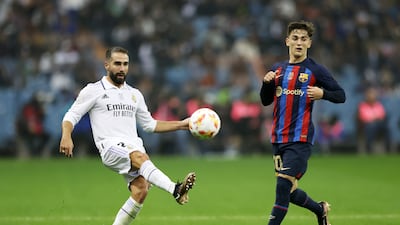"The World Cup is past,” said Christophe Galtier firmly, a post-match message to the various stars of Paris Saint-Germain, the club he coaches. Galtier was surveying the messy leftovers of a second Ligue 1 defeat in three games, uncharacteristic form for France’s dominant club.
They had just lost 1-0 at Rennes. Lionel Messi, Kylian Mbappe, Neymar and Achraf Hakimi were all on the pitch for the last 40 minutes, chasing a goal that, with a single shot on target all night, barely threatened to come. “We can find a thousand excuses,” sighed Galtier. And then he referenced the World Cup.
Messi and Mbappe both played, and starred, in the World Cup final, which ended deep into the evening of December 18. That’s a month ago on Wednesday, a distance of time away that’s more or less equal to what footballers normally have off from competitive action, if not from practice, after a major tournament.
The rescheduling of Qatar 2022 to winter, with most club seasons split in half to accommodate it and club football resuming after a break of between a week and a fortnight, has radically altered that timetable. It challenged the body clocks of experienced players. It exposed distinct tactical plans to those who were serving their country’s coaches during November and December.
The heavyweight clubs of Europe knew it would be disruptive. They, naturally, supplied a high number of the players who went deepest into the World Cup. There is tiredness, physical and psychological.
As Galtier on Sunday assessed PSG’s limp performance at Rennes, hot on the heels of a 3-1 loss at Lens, his observations about low intensity echoed several of his most esteemed peers on an eye-catching 48 hours of damage for seasoned champions.
Serial winners suffered everywhere. The weekend began with Juventus, domestic champions nine times in the past 11 seasons, having their run of eight consecutive victories brought to a thumping end at Serie A leaders Napoli.

Juve manager Max Allegri acknowledged Napoli, Italy’s best performers through the season, had been utterly superior in the 5-1 thrashing of his team. But he identified “a lack of energy” in his players. “It’s not just chance when the loose balls always get won by the opposition.”
Allegri did not cite World Cup fatigue, but the numbers tell a story. Juventus used 10 players who had been in Qatar in the starting XI against Napoli; two, Angel Di Maria and Adrien Rabiot, played in the final, as did Leandro Paredes, who came off the bench on Friday. Napoli had just three World Cup returnees in their XI, none of whose countries were in Qatar beyond the last-16 phase.
Manchester City, Premier League champions for four of the past five seasons, caught the stumbling habit. Saturday’s tight derby defeat at Manchester United cannot be easily blamed on post-World Cup exhaustion given that United had 13 players in Qatar to City’s 16. But when a team as meticulously drilled as Pep Guardiola’s City loses twice on the trot – they were also beaten in the League Cup at Southampton – it is cause to wonder about the effects of a mid-term interruption to training patterns and momentum.
Spain’s reigning champions and European Cup holders, Real Madrid, were humbled, too, albeit in a different competition – the Spanish Super Cup final – albeit against current La Liga leaders Barcelona.
A clasico loss always hurts, especially as Madrid had won seven of the previous eight. “The team is not at its peak,” said Carlo Ancelotti after Barca dominated, unflattered by the 3-1 scoreline in Riyadh. “There was very little intensity, we weren’t competitive in the duels.”
Have World Cup endeavours left Madrid leaden-footed? Barca sent more players to Qatar than their rivals, but Madrid had more of their key midfield duellers involved in the World Cup’s final weekend than Barca did. They are Aurelien Tchouameni, Eduardo Camavinga and veteran Luka Modric. That trio played in one – or both – the Super Cup final and the preceding loss to Villarreal.
A freakish weekend it may have been, being uniformly poor for the modern standard-bearers of Europe’s top leagues. Coming at the mid-point of the domestic season, it offers huge encouragement to the surprise risers.
To Barcelona, chasing a first Liga title that has not featured Messi since 1999; to Arsenal, whose last Premier League crown was in 2004 but who now hold an eight-point lead over City; to Lens, who if they win their next match will go joint top of Ligue 1 with PSG. And to Napoli, nine points clear in Italy and focused firmly on a first scudetto since 1990.





























































